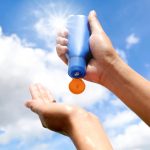Sunscreen WARNING: Cancer-causing chemical found in 78 popular sunscreen products
 (NaturalHealth365) Skin cancer affects more than 3 million people each year. Sunscreen is designed to protect us from skin cancer, but how safe are the popular brands we apply to our skin every summer? Here’s something to think about as the warm weather arrives: Sunscreens were first regulated by the FDA in the 1970s, long before current American guidelines for evaluating drugs were put into place. It should come as no surprise then that sunscreens didn’t undergo rigorous testing. However, what is shocking is that many of the sunscreens on the market today are more harmful than beneficial, and some even contain a cancer-causing chemical.
(NaturalHealth365) Skin cancer affects more than 3 million people each year. Sunscreen is designed to protect us from skin cancer, but how safe are the popular brands we apply to our skin every summer? Here’s something to think about as the warm weather arrives: Sunscreens were first regulated by the FDA in the 1970s, long before current American guidelines for evaluating drugs were put into place. It should come as no surprise then that sunscreens didn’t undergo rigorous testing. However, what is shocking is that many of the sunscreens on the market today are more harmful than beneficial, and some even contain a cancer-causing chemical.
According to a recent report by Valisure, an independent team of scientists that test the chemical composition of healthcare and medication products, benzene, a known cancer-causing chemical, was found in 78 sunscreen and after-sun products tested. In fact, “27% of samples tested by Valisure contained detectable benzene and some batches contained up to three times the conditionally restricted FDA concentration limit.”
High levels of benzene linked to blood type cancers
Benzene is a colorless or slightly yellow flammable liquid that’s naturally found in the environment. It’s often used as a solvent in manufacturing plastics and other products and is commonly found in gels, sprays, and lotions. While benzene is allowed in products like sunscreen up to a certain level, high concentrations of the toxic liquid are dangerous and can increase the risk of blood cancers like leukemia.
But why is benzene, a toxic carcinogen, even allowed in these products on a small level?
According to David Light, founder, and CEO of Valisure, “Benzene is one of the most studied and concerning human carcinogens known to science. Its association with forming blood cancers in humans has been shown in numerous studies at trace levels of parts per million and below.”
Valisure’s report isn’t the first time the potential health risks of sunscreen have made headlines. Over the years, studies have linked the chemicals in sunscreen to everything from hormone disruption to bioaccumulation in organs and tissue to severe allergic reactions.
Discover a Simple and Effective Way to Remove Toxins: This is Jonathan's #1 choice for at-home detoxification. Special offer ends Feb. 16.
In addition, there have been concerns that sunscreen prevents the body from making vitamin D. While most experts have concluded that sunscreens are unlikely to affect the vitamin D status of healthy individuals, the debate is reignited every summer.
In other words, the real biological effect of sunscreen in your blood is as cloudy as a bad day at the beach.
All the BURNING questions about sunscreen safety answered
Valisure is currently urging the FDA to recall the sunscreen products that contain high levels of benzene. A full list of the sunscreen products can be found here, on page 12 of the citizen petition Valisure wrote to the FDA on May 24, 2021.
As for which sunscreens are the safest, you can check out the Environmental Working Group (EWG) website and download the EWG’s Guide to Sunscreen. Here you will find a list of brands that contain safer ingredients, making it easy to choose a product that is the best fit for you.
What’s the bottom line?
If you plan to spend time in the sun this summer, make sure the sunscreen you apply is benzene-free and double-check the expiration date. Better yet, engage in a combination of sun protection methods: hat, umbrella, plenty of breaks, and time in the shade, along with benzene-free sunscreen.
Sources for this article include:



